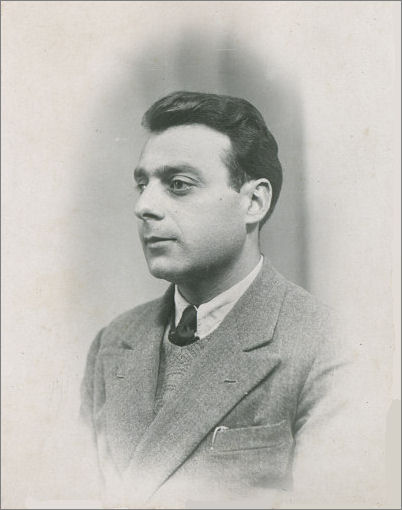Chapter 8 - A Letter from Italy

Sig. Eraldo Manfroni [24]
The content of the Air Ministry's letter of 20th June 1945 was soon to be confirmed later that year by an extraordinary letter dated 6th October from Sig. Eraldo Manfroni, who it transpired, had been a teacher at Polverara. Examination of several documents indicates that he had been witness to the crash scene, had actively participated in the funeral and burial arrangements and had personally taken it upon himself to contact the families of the five dead airmen.
The original letter (7 pages, 7.32 MB) to Sgt Smith's parents can be viewed here.
The story of the letter and much of its content was subsequently published on page 5 of the Ilkley Gazette on the 23rd November 1945. An image of the article can be viewed (769KB) here.
|
The letter occupied over six closely typewritten quarto pages. It is the work of Eraldo Manfroni , a teacher at Polverara and resident in Las Spezia. It would appear that a similar letter has been sent to two other families of members of the crew, and he asks to be supplied with the addresses of the remaining two families, so that he might send to them a similar memorial. The writer explains at the outset that "human pity and gratefulness feelings guide him to send this memorial of the sacrifice of their relatives. There are many expressions of gratitude for the service rendered by the allies in the fight against Fascist tyranny, and a touching prayer which he conceives the dying might have made in their fall. Crash in Thunderstorm There follows a day-to-day account from November 24 1943 to November 30 1943 of what took place on the side of Monte Croce following the crashing of the 'plane. It was during a violent thunder storm that countrymen heard the sound of the 'plane and saw flashes of light. Through the storm, in pitch darkness they made their way to where the 'plane was blazing, but were unable to approach too near on account of the heat and the explosion of projectiles. Next morning the discovered it was an English 'plane, falling in the locality of Venturello about ten kilometres from Spezia, on the path going to Monte Croce. Among the books and magazines was found a card addressed to Mrs W. H. Smith, Pelton Cottage, Manley Grove, Ben Rhydding, and next day was found a document which gave the names of the five men in the 'plane. The German military authorities did not arrive until November 27, and the medical doctor, after seeing the bodies, declared that each of the five must have died immediately. The Funeral The letter tells, too, how a kindly German interpreter showed the writer photographs of Sergeant Smith, and the German Authorities said that every personal document would be sent to the International Red Cross. On November 29 the bodies were removed in coffins to Polverara, where on November 30, a service was held in the Church. The writer gives a carefully detailed account of the funeral service with women and boys continuously placing flowers on the coffins, of the burning of incense, and of the deep emotion aroused in the onlookers. The coffins were afterwards borne to the Polverara communal cemetery. Permission to photograph the transfer of the coffins was refused, and the writer tells of the impatience of the Nazi Fascist military representative waiting near the gate, impatient because of the homage being paid to the fallen. A Moving Scene In his faulting English there is given a very moving picture of the scene and of his thoughts while acting as a coffin bearer. "Between two lines of crowd defile the coffins," says the letter. "In every glance, in every gesture, in every attitude, an expression of sadness is marked. I uphold the coffin from one side and I think - If my hand might have shaken the young aviator's hand when he was to liberate towards the blue sky, instead of this piece of wood; if my arms might have embraced the shining body of the hero while he was going towards the extreme sacrifice, instead of these wood slabs…. "I walked and upheld that sacred weight; I would defend it for a sense of pride that made me fervent, for a sense of sorrow which tormented myself." He goes on to describe the internment, the German officer calling the name of each man, the Fascisti militia-men responding to each name with a volley of gun-fire, whilst the Germans saluted. From a Wide Area Hundreds of persons came from the Valley of Vara, and from Spezia, to the funeral, and the Fascist militia and the Germans expressed their appreciation of the ceremony and the great quantity of flowers offered to the fallen. Finally there is given a detailed account of how the cemetery may be found should their families make a pilgrimage to the place. He adds that soon after the falling of the 'plane, some countrymen, who afterwards enlisted with the partisans, took off from the 'plane, at a moment when the Carabineri were absent, three "mitrailleuses" in very good
condition. They would be employed to achieve the same aims as had inspired the five English heroes. |
Eraldo's determined efforts had ensured that the next of kin of each crew member were contacted
